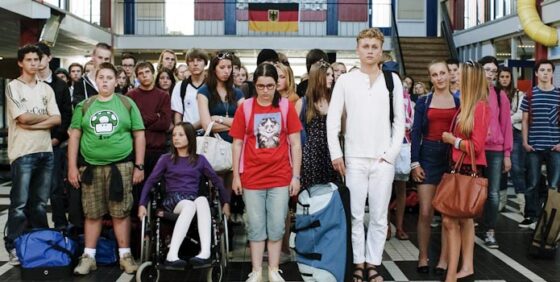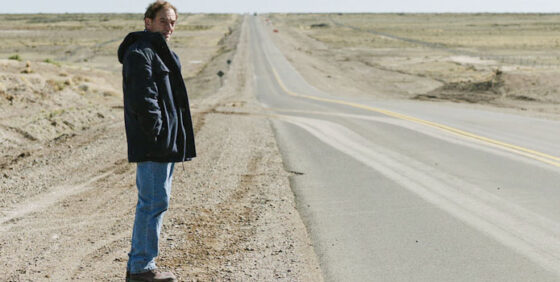TIFF Day 5: Antiviral | The Capsule/Walker | The Deflowering of Eva van End | Gone Fishing | The Impossible | Passion | The Pervert’s Guide to Ideology | Tout ce que tu possèdes | What Richard Did
Antiviral (Brandon Cronenberg, Canada)—Special Presentation
By John Semley
Maybe the most frustrating thing about the debut by David Cronenberg’s twenty-aught son is that calling it “Cronenbergian” doesn’t really work: it’s less a value judgment on its glaring paternal influences than a statement of fact. To be sure, Brandon Cronenberg has inherited more than a genetic legacy, working through overstated “contemporary” anxieties about celebrity culture via this character study of a freckly mad scientist (Caleb Landry Jones) whose obsession with a porcelain-skinned starlet (Sarah Gadon) drives him to black market genetic indiscretion.
Antiviral is set, unashamedly, in a near-future (or alternate-present) Toronto, where Jones’ Syd March works at a clinic specializing in bespoke diseases harvested from the bodies of ailing superstars. (That it makes its Canadian premiere during TIFF, when the presence of Toronto’s celebrity hounds is at its most pronounced, suits the film’s own unintentional humour.) At home, March dines on individually packaged units of food—everything’s disposable, see?—and slaves away in private on his own customized viruses on an analog doohickey that renders abstracted human portraits of the diseases: a homemade Francis Bacon-ator.
Like his father, Brandon C. seems concerned with issues of disease and decay, both physiological and cultural. The structuring difference is that where many of Cronenberg the Elder’s films seemed believably consumed with their characters’ backslides into transgression, perversion, and often physical mutation, Antiviral seems to pride itself on its chilly detachment. (It’s also chockablock with intravenous injections, needles allegedly being one of Papa C.’s bugaboos.) Given that Brandon has clearly piggybacked on both his father’s sensibility and name-brand cache, riding his coattails all the way to Cannes, Antiviral remains damnably conjoined to the larger construct of Cronenbergia. As his film attests, he’s clever enough, and possesses enough basic stylistic confidence, to cook up and carry out his own icky body-horror concepts. From anyone with a different last name, such conceptual debts would be laughably indefensible. Here they just seem dull—and often, just laughable. Does it even make sense to denounce genetics as derivative?
The Capsule (Athina Rachel Tsangari, Greece)—Wavelengths
Walker (Tsai Ming-liang, China/Hong Kong)—Wavelengths
By Robert Koehler
In this electoral season full of lies, here’s a fact: two of the year’s best films total a combined playing time of 63 minutes. Each represents the sudden explosion on the world cinema scene of brilliant mid-length films (see João Pedro Rodrigues’ fantastic zombie movie Morning of St. Anthony’s Day), each represents almost directly opposite aesthetic and cultural tendencies, and each is an unflappably daring and fully realized vision. That v-word is usually to be avoided at all cost, but it seems insufficient to apply to both Athina Rachel Tsangari’s The Capsule and Tsai Ming-liang’s Walker (the latter was paired in its Cannes Semaine de la Critique premiere with the Rodrigues).
Tsangari takes a startling leap away and beyond her debut feature Attenberg (2010) with a danse macabre involving a group of kinetic, highly fashionable women (donning the work of Montréal designer Ying Gao) commandeered by an imposing mistress, who rules space and time in a castle on the Greek island of Hydra, itself laden with the mythic. A sustained tour de force drenched in horror, Buñuelian absurdity and what is clearly developing as a directorial view informed by the perverse and comic in equal measure, The Capsule packs more ideas, sensations and associations into its under-40 minutes than 99.9% of the features you’ll see this or any year.
Tsai (whose name nicely places just above Tsangari’s in the alpha list of your absolutely essential movie artists) is similarly interested in movement, but cranked down to a pure, Zen-like slowness. His precise, encompassing camera considers his regular collaborator Lee Kang-sheng as a Buddhist monk cloaked in red and silently moving through busy urban streets, a study in absolute solitude amidst bedlam. One particular shot, viewing Lee’s monk in the middle of crosswalk on a Hong Kong street, is like a summa of Tsai’s cinema, loneliness and silence coexisting with a city’s overwhelming wall of sights and sounds.
The Deflowering of Eva van End (Michiel ten Horn, The Netherlands)—Discovery
By Adam Cook
A succession of meaningless camera set-ups and gestures strung together into something resembling a feature film, The Deflowering of Eva Van End is the misguided first feature from Amsterdamian director Michiel ten Horn. Still shots of mundane home life, Nolan-esque push-ins and twirling camera moves ostensibly communicate the static, detached existence of a bourgeois family’s routine-regimented lifestyle. The title character, a detached teenage girl, is only one of these disillusioned family members, each afforded their own subplot of lukewarm misery. It’s a film full of cards we’ve seen played before and with greater tact and sensibility. When the stylized title card makes its awkward appearance scrolling over a quiet shot of a tree, the film’s central flaw—a complete clash between its toned-down, low-drama vibe and quirkier ambitions of indie-flavoured malaise porn—is made all too clear. Horn is not completely without ideas, but he makes missteps at nearly every turn, mishandling every humorous gesture. In a film where the characters are what should matter, the performances are played down so much as to have no effect, leaving us with a series of vignettes of strangers whose feelings and discontent are only implied by the cinematography, which telegraphs to the point of annoyingly repeating itself over and over. One shot of Eva, riding on the back of a bike of a visiting exchange student who becomes the object of her affection—and the deflowerer in question—is cute, and a quick cut to them at home, from a poppy music cue to silence, with the boy awkwardly asking “Do you like music?” is a nice moment, or would be if it fit with the film. Some choices at least suggest this isn’t a director who necessarily should be written off entirely. Two strikes remain, I suppose.
Gone Fishing (Carlos Sorin, Argentina)—Contemporary World Cinema
By Blake Williams
Carlos Sorin has made a career out of departing and returning to Patagonia. Setting essentially every other one of his films there for the last decade, he’s laid out a trajectory that, in retrospect, is probably less motivated by a self-designated auteurist narrative and more due to an ambivalence he has toward the kind of films he wants to be making. Sorin’s recent films set in the shared Argentinean-Chilean region, which includes his new Gone Fishing, are steeped in a melancholic sentimentality and tend to be critically lauded as “small” and “beautiful”; his films made elsewhere (The Road to San Diego [2006], The Cat Vanishes [2011]) garner adjectives like “abstract,” “stylish,” and “bizarre,” and are ultimately deemed as failures.
Gone Fishing, a lulling drama that episodically chronicles a 50-year-old man’s return to Patagonia, is a continuation of Sorin’s artistic stasis, but could also register as a despairing critique on his back-and-forth pattern. There isn’t a mean-spirited or offensive bone in its body, yet there are several Sorinian interludes that occasionally drop in to clear the air: a pause on a female boxer’s gruesomely swollen face after a brutal match; a show-stopping aria performed live at the dinner table with a swelling, non-diegetic orchestral accompaniment that stands off enough so that it still somehow registers as a cappella; and a boating trip that turns rocky and causes a man to vomit up something resembling custard. Singular as these moments are, there isn’t enough of them to balance out the overall placidity of it all; worse, there is hardly any suggestion that Sorin is fed up enough with this movie to ensure that he’ll never make it again.
The Impossible (Juan Antonio Bayona, Spain/USA)—Special Presentation
By Angelo Muredda
The first hint that The Impossible won’t be in good taste comes before the credits, with the overhead whoosh of a jet carrying a British family to Thailand; wouldn’t want to waste that immersive 3-D sound technology, boasted in the otherwise sombre press notes. The Indian Ocean tsunami had an enormous reach, but J.A. Bayona’s hand-wringing thriller conveniently stays with a vacationing married couple (Naomi Watts and Ewan McGregor) and their three boys as they’re swept from their resort and deposited across town. The point isn’t that Bayona should have followed the angry sea as it struck a rainbow coalition of locals, like Babel’s (2006) time-zone-hopping rifle, but that suffering white tourists are just what you’d expect to see in a shameless international co-production about a disaster that devastated Southeast Asian coastal communities.
Despite its sanctimoniousness, The Impossible works in more genre scares than Bayona’s first feature The Orphanage (2007), including a nightmare of an undead Watts rising from a watery grave. These are slickly handled, as is the money shot of mother and son’s downstream drift. But they betray a gross showmanship, nowhere more evident than in Watts’ humiliating rite of being battered and bared before her son, all in the name of phony realism. If the tight close-ups and panoramas don’t make it clear that this is discount Spielberg, what seals it is a grotesquely sentimental moment where the survivors list the vaguely foreign names of the unsaved while riding their helicopter to safety—Schindler’s List (1993) and Jurassic Park (1993) brought together in a tawdry embrace.
Passion (Brian De Palma, France/Germany)—Special Presentation
By Christoph Huber
By my estimate the only flat-out-funny film in Venice competition—or maybe it just uplifted by luridly stalking in at the end and not dealing with religion—Brian De Palma’s Passion turns Crime d’amour (2010), the wonderful last film of French master Alain Corneau, into an OTT BDP battlefield. In a hilarious send-up of international co-production necessities, this Berlin-based revenge thriller imports Rachel McAdams, Noomi Rapace, and a handful of other international alumni directed to blend in with the unbelievable performances of German supporting players. (For native speakers, every German sentence is gold: they even manage to fuck up the obligatory “Scheiße!” screams in the women’s prison segment.) No point in dealing too much with the plot, which emphatically stops making sense midway anyway, disintegrating with Rapace’s character as lighting schemes and and camera angles go all ’80’s ad-style expressionism. Like the flagrant product placement, this can only be a joke in a film set in the advertising biz, where Rapace rises thanks to her ingenious (the funny just keeps coming) “ass-cam” campaign, which inspires McAdams—declaring “I know talent when I see it!”—to draw her into a world of shopworn kinky sex games and corporate backstabbing. All smoke and mirrors to the great Brian, who orchestrates this vintage ’80’s trash fodder with beyond-postmodern digital abandon, as if to embalm a lost culture, and especially his own work, down to the obligatory split-screen scene. (If Harmony Korine channels the great Andy Sidaris in his pop-culture vanitas Spring Breakers—a kind of hip-hop video Hieronymus Bosch— for Brian none other than himself will do. And does.) Unless Passion is a documentary about the Berlin Republic, represented by the capital’s most hellish stretch (not unfamiliar to Berlinale sufferers) as glossy poster art, in which case it is one of the most depressing exposés of recent years.
The Pervert’s Guide to Ideology (Sophie Fiennes, UK/Ireland)—Mavericks
By John Semley
In the sequel to their cine-essay The Pervert’s Guide to Cinema (2006), enfant terrible philosopher Slavoj Žižek and director Sophie Fiennes move beyond the screen, with a totalizing critique of what Žižek claims is the prevailing social ideology. Everything’s game: The Sound of Music, Nazi propaganda, Coca-Cola, Kinder eggs, the London Riots, and so on and so on, whatever.
As with the previous film, Žižek’s Marxist/Lacanian inkblot analyses of cinema are thorough, even when they don’t necessarily seem warranted by the material itself. His introductory thoughts on John Carpenter’s They Live (1988) prove particularly incisive, not least because the film (and its anti-consumerist X-ray specs) essentially makes Žižek’s ideological critique for him. Opening with a clip of Roddy Piper threatening to make a bad guy eat trash, Žižek offers his perfectly pithy encapsulation of our participatory role in force-fed social ideology. “I am already eating from this trashcan,” he slurs, while standing in front of a dumpster. (He also perches himself in one of the film’s beauty parlour chairs, framed by a sign that reads “NO THOUGHT,” a handy auto-critique for anyone disinclined to buy what Žižek’s selling.)
In places, Žižek makes attempts to jump into the political dimension, be it by comparing the shark in Jaws (1975) to the Third Reich Jewish scapegoat (the fear that contains “the multiplicity of fears”) or claiming that the 2011 lone-wolf terrorist attacks in Norway were really a “reaction to the confusion of global capital.” As ever, it’s hard to shake out what exactly Žižek intends us to take seriously, especially when he makes concluding pronouncements that the revolutionary Left must be realists “by demanding the impossible.” What Žižek seems to practice is more an ornate form of radical pessimism, offering thorough, compelling social diagnoses with not much in the way of meaningful prescription. Still, even when it seems like he’s serving up warmed-over rubbish, it’s good fun dining out of Žižek’s trashcan.
Tout ce que tu possèdes (Bernard Émond, Canada)—Masters
By Adam Nayman
Whether or not Bernard Émond is a master (or a Master), he has to this point cultivated a recognizable sensibility. This avowed Bressonian’s films share a certain hushed quality: they’re dramas delivered in a stage whisper. And they have all showed at TIFF, a flawless batting average (better even than Carl Bessai!), which suggests that somebody—programmers, audiences, whoever—can make out what this undemonstrative director is trying to say over the din of so many other Canadian films.
In most respects, Tout ce que tu possèdes is recognizably Émond-ish, putting a taciturn protagonist, in this case a Québec City academic named Patrick (Patrick Drolet), through the existential wringer, en route to either self-actualization or self-destruction (or perhaps both at once). Drolet’s character is obsessed with his ongoing translation of the late Polish poet Edward Stachura, possibly because he identifies with the work’s dim, self-flagellating tone—the common refrain is “my fault”—and possibly because he knows that fiddling with syntax is a way to avoid the real work of getting on with a life that long ago went off the rails. Trains and train tracks loom large in the film: Stachura was injured in a freak train accident in the year before his suicide, and Patrick seems as drawn to the gloomily Romantic circumstances of his hero’s death as the stark, bleak prose he left behind. The idea of art-as-death pulls him in one direction, while an urgent tug down a more redemptive path comes from the teenaged daughter he unexpectedly reconnects with years after leaving her mother in the lurch. It’s an only-in-the-movies development that Émond milks for no more (though also admittedly no less) sentiment than a dozen other parent-child reunion films, though also admittedly most parent-child reunion films don’t involve discussions about Balzac.
Disconnected from Émond’s pretentiously Kieslowskian “official” trilogy about Christian virtues (spoiler alert: they all proved very difficult to find for the people therein), Tout ce que tu possèdes has some shape, and even some laughs, and Drolet is an appropriately wary, haunted presence. But the heavy, grinding forward motion of the story, while aptly mirroring Emond’s underlying locomotive motif, makes one feel as if he is on a slow ride indeed. And if the final destination proves worth it for the character—this may be Émond’s most optimistic film—those without a rooting interest in the director’s career might be advised to save themselves the trip.
What Richard Did (Lenny Abrahamson, Ireland)—Contemporary World Cinema
By Adam Nayman
It is one of those funny coincidences of festival programming that Lenny Abrahamson’s What Richard Did touches down at TIFF in the shadow of Ramin Bahrani’s At Any Price, with which it shares a major plot point: the reaction of a father to a teenaged son’s confession of a terrible crime. But where Bahrani inflates this scenario with a lot of quasi-Biblical hot air—i.e. is Zac Efron his (metaphorical) brother’s keeper?—Abrahamson doesn’t try to make it signify anything more than an extremely painful moment for two characters who we’ve come to care about, and who are played by skilled and sensitive actors. The advantage here goes to the Dubliner.
The early scenes of What Richard Did are perhaps a little too laden with portent: when high school rugby star Richard (Jack Reynor) first makes eyes at his teammate’s girlfriend Lara (Roisin Murphy), we sense that this is going to be a fatal attraction (a key exchange takes place in front of a blazing red sign reading “Stop”). And yet there’s also something natural and recognizable in this vision of adolescents clinging to juvenile mischief as a way of staving off the future, and the string of pub crawls, house parties and beach-blanket make-outs that precede the film’s central tragedy all play out believably, despite the over-attractiveness of the actors. Abrahamson also manages the story’s hard turn into solemnity with a steady hand, and even the scenes that one might dread—like Richard’s almost feral outpouring of solitary grief as he tries to keep a secret that makes him sick—finish up with the actors unscathed and the audience unembarrassed. Reynor may get some emerging-star buzz for his performance, which runs the gamut from easy charm to heavy suffering, but the MVP is actually the redoubtable Lars Mikkelsen, brother of Mads, who plays Richard’s dad and manages in his short amount of screen time to make us believe that he’s feeling many things at once.












